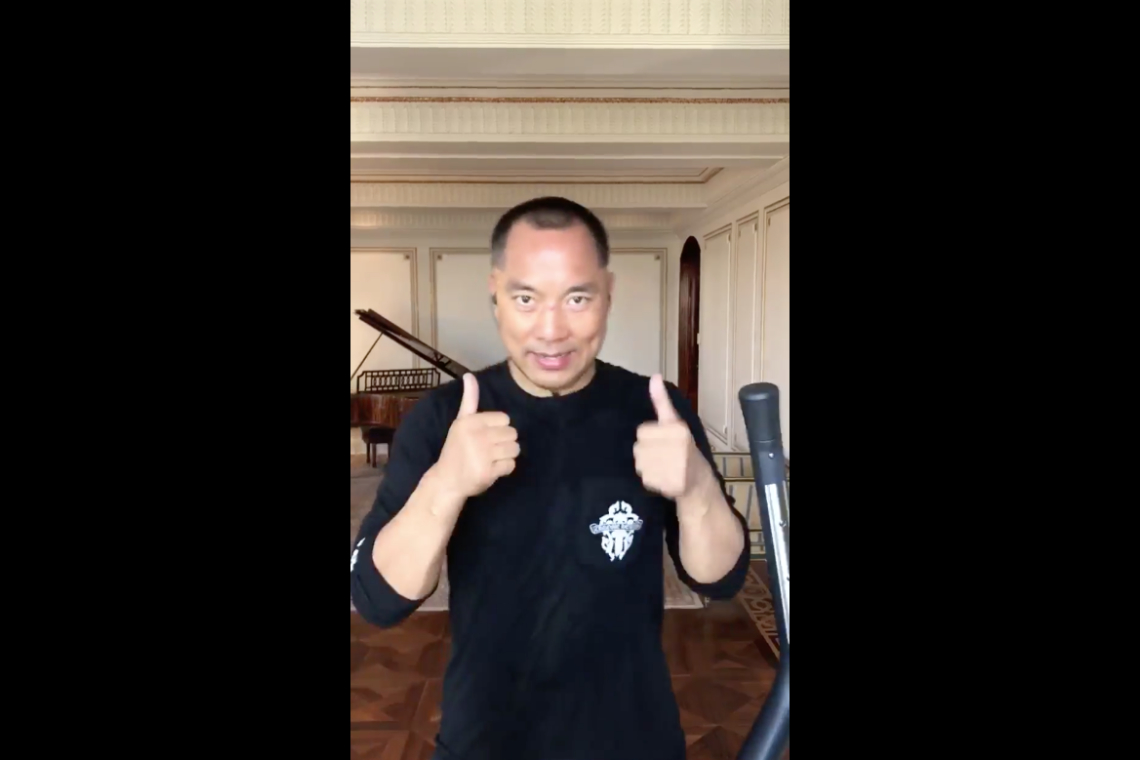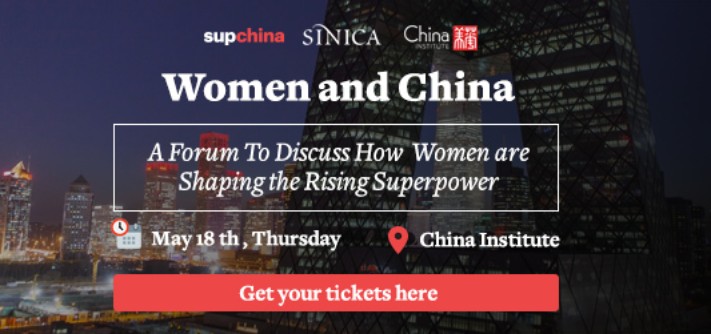A billionaire on the run
Top China news for April 19, 2017. Get this daily digest delivered to your inbox by signing up at supchina.com/subscribe.

Billionaires in trouble
In the last days of January this year, media reported on two intriguing stories about politically connected Chinese billionaires. The tycoon Xiao Jianhua 肖建华, founder of the Tomorrow Group, was removed by Chinese police from his apartment at the luxury Four Seasons Hotel in Hong Kong.
In the U.S., another businessman, Guo Wengui 郭文贵, aka Miles Kwok, who had vanished from public view in January 2015 after apparently being taken into custody by the police, reappeared in a video carried by Mingjing, a Chinese news and political gossip website based in the U.S. In the video, Guo alleged misconduct by a senior Chinese police official, and said that his battles against business rivals were part of a larger political struggle.
They are both back in the news:
The Wall Street Journal reports (paywall) that Xiao Jianhua “has previously undisclosed ties to China’s military,” and that “firms linked to Beijing’s formidable arms-trading conglomerate, China Poly Group Corp., executed at least three recent transactions involving Xiao…including a $10 million donation to Harvard University.” The Journal notes that Xiao could not be reached for comment, and that “Chinese authorities have said nothing.”
Guo Wengui has, as we noted on Monday, been furiously giving interviews and posting to Twitter about high-level corruption, which he says extends to the top levels of the Politburo.
In the Sinocism newsletter, respected China-watcher Bill Bishop says that “Guo had promised even more explosive charges in an interview scheduled for three hours this morning with VOA. Beijing, clearly worried about Guo’s accusations, requested Interpol issue a ‘red notice’ for him.” Bishop also notes that “in spite of his earlier claims that he supported Wang Qishan, Guo today claimed that Wang Qishan’s nephew on his wife’s side was a shareholder in the mysterious and powerful HNA Group.” HNA owns Hainan Airlines, and has recently been engaged in what the Economist calls (paywall) a “global shopping spree,” investing in Hilton Hotels and Deutsche Bank, among many other companies.
Guo did not get to broadcast his allegations in VOA: The state-owned American radio station terminated the interview without explanation. But the exiled billionaire remains active on Twitter, where he continues to discuss high-level corruption and stream videos of his gym routine (in Chinese). If the Interpol “red notice” has any teeth, being able to run fast will be useful.
If you want to keep tabs on the continuing saga of Xiao and Guo, follow James T. Areddy of the Wall Street Journal, Mike Forsythe of the New York Times, and Bill Bishop.
Trump spokesperson: The earth is round
As we noted yesterday, the U.S. naval flotilla that media reports said were headed for the Korean Peninsula were, in fact, not headed anywhere near Korea. Rather, they were on their way to Australia to take part in naval exercises there. Here is a video of Donald Trump claiming that he had sent ships to North Korea last week. And here is a tweet from New York Times White House correspondent Peter Baker quoting the president’s press secretary, who says that “Trump was right to say ships were ‘heading’ toward North Korea because [they] will, eventually.”
As the Globe and Mail reports, “many Chinese took to social media to joke about it…‘American imperialism is a paper tiger,’ said one user on Weibo.”
Rebel Pepper wins Index on Censorship award
Satirical Chinese cartoonist Rebel Pepper (变态辣椒 biàntài làjiāo), who is currently exiled in Japan, was awarded a “Freedom of Expression Award” by the Index on Censorship organization.
—Jeremy Goldkorn, Editor-in-Chief
This issue of the The China Project newsletter was produced by Sky Canaves, Lucas Niewenhuis, Jia Guo, and Jiayun Feng. More China stories worth your time are curated below, with the most important ones at the top of each section.
BUSINESS AND TECHNOLOGY:
Central bank regulation backfires as shadow banking flourishes
The People’s Bank of China’s efforts to reduce debt in China’s economy may have increased financial risk overall. Bloomberg reports that “off-balance sheet lending,” the less-regulated type of loaning also known as shadow banking, “surged 754 billion yuan ($109 billion) in March, taking the first quarter’s total increase to a record 2.05 trillion yuan.”
The surge is a direct response to restrictions that the central bank put in place on financing through the closely regulated bond market, as “debt-reliant borrowers,” particularly real estate developers, hit a limit on how much they could borrow from large banks and turned to alternative forms of lending.
An illustration of the continuing risk in the financial system comes as at least 100 investors have collectively lost 3 billion yuan ($436 million) to fraud at a branch of Minsheng Bank in Beijing. Caixin reports that wealthy investors at the bank’s Hangtianqiao branch had been sold a wealth management product (WMP) without knowing it was unauthorized by Minsheng Bank’s headquarters. Furthermore, an internal company investigation revealed that the seal for a commercial acceptance bill for another loan had been faked.
- China bank overseer launches ‘regulatory windstorm’ / Financial Times (paywall)
Guo Shuqing 郭树清, head of the China Banking Regulatory Commission, has approved seven policy documents in the past 12 days, largely to build a policy framework to better manage the shadow banking industry. - China’s answer to PayPal coming to the rest of Asia / Mashable
Ant Financial of Alibaba and HelloPay of Lazada have officially merged, a year after the deal was announced. - China targets live-streaming apps in latest Apple encroachment / Bloomberg
- China eases yuan outflow controls in sign of recovered confidence / SCMP
- China has yet to stop its runaway property bubble / Nikkei Asian Review
- China’s carmakers may be ‘destroyed’ if foreign venture cap lifted / Bloomberg
- United chief met Chinese officials over dragged passenger / Reuters
POLITICS AND CURRENT AFFAIRS:
Major mid-level reforms in the military
Reuters reports that President Xi Jinping has announced a major reorganization of the mid-level structure of the People’s Liberation Army (PLA). This appears to be the beginning of a second step of military reform following the initial phase of rooting out high-level corruption and cementing Xi’s authority over the entire military. The new structure centers on 84 condensed military units, under the authority of the 15 military agencies established last year, with enhanced joint operations capability. Xinhua reports (in Chinese) that Xi’s announcement came with a list of four directives: to resolutely listen to the Party’s commands, to be ready for battle at any moment, to upgrade combat ability, and to cultivate a perfected combat style. The announcement also included an acknowledgement that the military is still undergoing a slimming of its troops by 300,000, which was initiated in 2015.
- China provokes India by renaming 6 places in Arunachal, Beijing terms move ‘legitimate’ / Economic Times
The move by China to standardize its official names for six locations in a contested border region — referred to as “Arunachal Pradesh” by India and “South Tibet” by China — contrasts with reports yesterday that China was softening its tone with India. - China is playing peacemaker in Myanmar, but with an ulterior motive / Foreign Policy (paywall)
- Ai Weiwei questions HK autonomy after being denied bank account by HSBC / Asian Correspondent
- Lawsuit against Trump now includes China trademarks / The Hill
SOCIETY AND CULTURE:
Crowded classrooms
Sixth Tone reports on overcrowded conditions at Chinese schools: In central China’s populous Henan Province, one primary school has an average of 113 pupils per classroom, and a middle school has an average class size of 109 students. The article says that “disparity also exists between economically advanced eastern coastal areas and poorer provinces in central and western China, where overcrowded classes are more common.”
- Hang gliding in Malibu. Touring a Beverly Hills mansion. The Chinese will be able to experience it all before visiting / LA Times
Virtual reality technology “is becoming an important marketing tool to reach Chinese consumers looking to travel.” - China’s Stone Age skiers and history’s harsh lessons / NYT (paywall)
“Cave paintings in the Altai Mountains may show the cradle of skiing is in China. But the ethnic minorities who live there worry the old ways are in danger.” - Shandong vaccine scandal damages confidence in China health system / Financial Times (paywall)
- Court hears family feud over US$2.9 billion estate of Chinese tycoon who died in France helicopter crash / SCMP







